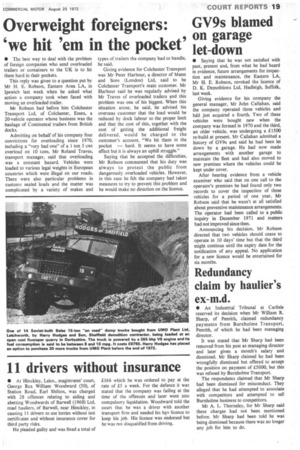we hit , em in the pocket ,
Page 21

If you've noticed an error in this article please click here to report it so we can fix it.
• The best way to deal with the problem of foreign companies who send overloaded trailers or containers to the UK is to hit them hard in their pockets.
This reply was given to a question put by Mr H. E. Robson, Eastern Area LA, in Ipswich last week when he asked what action a company took when faced with moving an overloaded trailer.
Mr Robson had before him Colchester Transport Ltd, of Colchester, Essex, a 20-vehicle operator whose business was the haulage of Continental trailers from British docks.
Admitting on behalf of his company four convictions for overloading since 1970, including a "very bad one" of a 1 ton 3 cwt overload on 10 tons, Mr Roland Traves, transport manager, said that overloading was a constant hazard. Vehicles were loaded to various legal weights in European countries which were illegal on our roads, There were also particular problems in customs sealed loads and the matter was complicated by a variety of makes and types of trailers the company had to handle, he said.
Giving evidence for Colchester Transport was Mr Peter Harbour, a director of Mann and Sons (London) Ltd, said to be Colchester Transport's main customer. Mr Harbour said he was regularly advised by Mr Traves of overloaded trailers and this problem was one of his biggest. When this situation arose, he said, he advised his overseas customer that the load would be reduced by dock labour to the proper limit and that the cost of this, together with the cost of getting the additional freight delivered, would be charged to the customer's account. "We hit them in the pocket — hard. It seems to have some effect but it is always an uphill struggle."
Saying that he accepted the difficulties, Mr Robson commented that his duty was always to protect the public from dangerously overloaded vehicles. However, in this case he felt the company had taken measures to try to prevent this problem and he would make no direction on the licence.




















































































